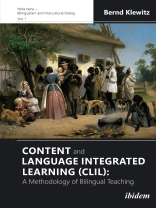Learning foreign languages is a process of acquiring authentic contents in cultural contexts. In this respect, bilingual programs provide an effective connection between content-based studies and linguistic activities. The European umbrella term CLIL (Content and Language Integrated Learning) not only comprises the aims and objectives of a sustainable format of teaching foreign languages but also the priority of content over language, in other words: language follows content, as in the Bauhaus precept form follows function. But in order to effectively integrate content and language, a comprehensive pedagogical approach is needed that goes beyond existing curricula and guidebooks.
Bernd Klewitz aims at establishing the CLIL methodology by linking content requirements of subject areas, especially those in the social sciences, with linguistic building blocks and tools. The integrative methodology of bilingual programs extends to the study of literature, traditionally a domain of language tuition, but thought to be a seminal part of CLIL as well.
The building blocks and language tools presented in this volume focus on learning foreign languages in cultural contexts, aims, and objectives of CLIL, parameters of an integrated bilingual teaching strategy, dimensions of bilingual learning, elements of a CLIL concept, Literary CLIL, CLIL tools and strategies, modules with worked examples, challenges, and desiderata, and a comprehensive glossary. Each section is completed with an interactive part of review, reflection, and practice.
Mengenai Pengarang
Bernd Klewitz, Dr. habil., is an educational psychologist, whose work focuses on science-oriented teaching and learning English as a foreign language in different contexts. Having spent a decade in English-speaking countries such as Australia, the UK, and the USA, he now works as a lecturer.
He trained as a grammar school teacher and gained his Ph D in Oral History at the Philipps-University Marburg. As an advisor and regional coordinator for the Hessian Ministry of Education in Wiesbaden, he supported the introduction of the Language Core Curriculum and advised school principals implementing competence-oriented teaching strategies. For the last four years he has been conducting seminars about Scaffolding and CLIL at the Universities of Göttingen and Jena.
Klewitz has published widely known practice-oriented textbooks and manuals that focus on authentic language learning with a major emphasis on Instructional Scaffolding. In his most recent publication, he advocates literature as an independent subject of bilingual language teaching and learning (Literary CLIL: Literature in the Bilingual Classroom, Herne 2020).












